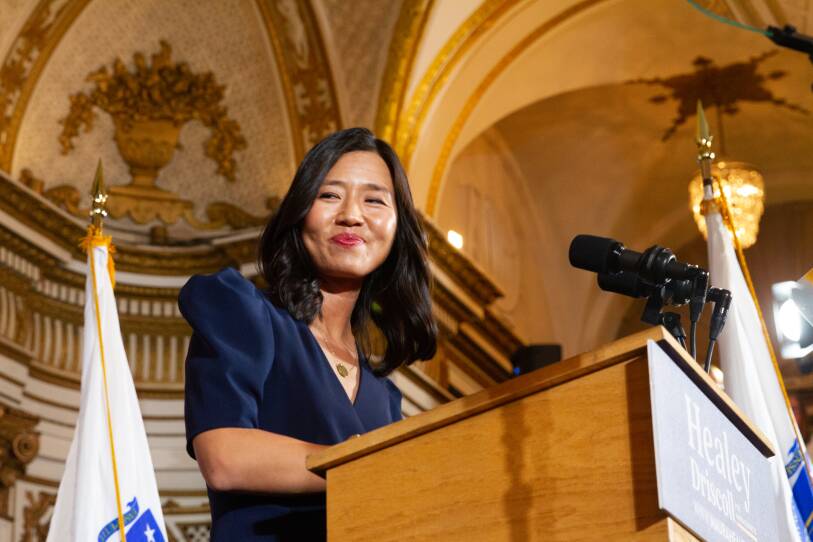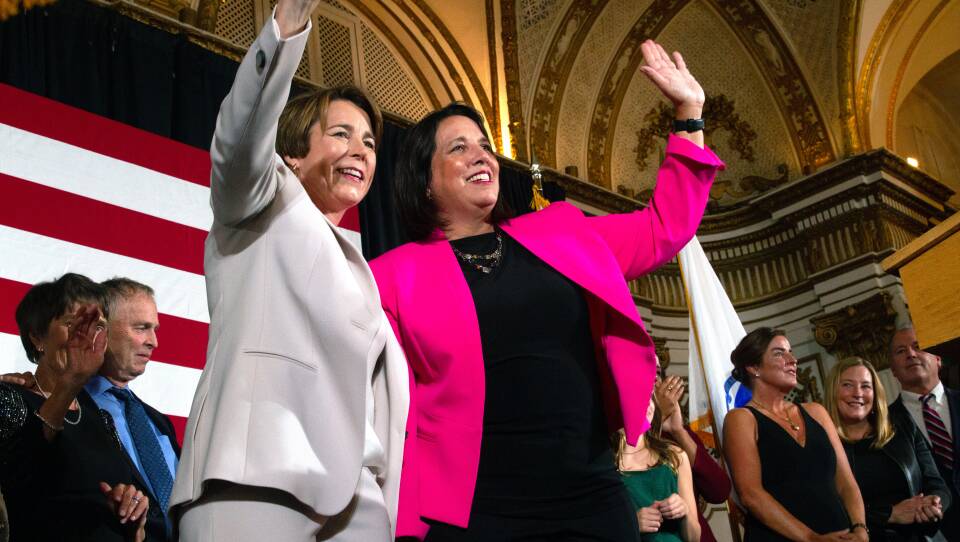Massachusetts voters for the first time Tuesday elected a woman and an openly gay person to be their governor — a history-making win for Attorney General Maura Healey eight years after she burst onto the state’s political scene as a newcomer who beat the party establishment.
"Tonight I want to say something to every little girl and every young LGBTQ person out there. I hope — I hope — tonight shows you that you can be whatever, whoever, you want to be," Healey told a hotel ballroom packed full of supporters, drawing applause. "You kids know that nothing — nothing and no one — can ever get in your way except your own imagination, and that's not going to happen."
The Boston Democrat is on track to become the first openly lesbian governor in the United States, a distinction also sought this year by Oregon Democrat Tina Kotek. Healey’s path toward that goal covers ground first cleared by other Massachusetts politicians along with her own milestones: she was the first openly gay state attorney general in U.S. history.
Boston’s Elaine Noble in 1974 became the first openly gay person elected to any state legislature, winning her seat in what she described as an ugly campaign and going on to face harassment from her peers on Beacon Hill. Nine years later, David Scondras was elected as Boston’s first openly gay city councilor. And in 1987, Brookline Democrat Barney Frank made history as the first member of Congress to voluntarily come out as gay.
Arriving at the Fairmont Copley Plaza before polls closed, state House Speaker Pro Tempore Kate Hogan said she was looking forward to celebrating Healey’s win. Hogan, a Stow Democrat, is the first LGBTQ lawmaker to hold House leadership’s number-three spot.
“It’s been a lifetime of unexpected victories, in so many ways, and tonight will be a huge victory for women, for the LGBT community,” Hogan told GBH News. “And to see our first governor take the stage, the first LGBT governor, will just be thrilling beyond words.”
Raised in New Hampshire, Healey, 51, played professional basketball for two years in Austria after graduating from Harvard, and returned to Massachusetts to attend Northeastern University School of Law.
With campaign swag featuring the slogan “my governor is a baller,” Healey leaned into basketball rhetoric on the trail, as did her running mate Kim Driscoll, who played basketball at Salem State University. The election night event featured a photo area for supporters with rainbow campaign signs and basketball themed props with phrases like “Game Day” and “Nothin’ But Net.”
In her victory speech, Healey thanked "the ballers out there, who through five decades — in gyms and on playgrounds — taught me about hard work, teamwork and toughness."
Basketball photo booth props at Healey HQ pic.twitter.com/Cpjj5MFtGK
— Katie Lannan (@katielannan) November 9, 2022
Early in her career, Healey worked at the Boston law firm WilmerHale before going on to serve in the office of Attorney General Martha Coakley. As chief of Coakley’s civil rights division, she led Massachusetts’ successful challenge of the federal Defense of Marriage Act.
When Coakley ran for governor in the 2014 election against Charlie Baker, Healey mounted her own bid for Coakley’s seat. First-time candidate Healey was an underdog, claiming a decisive upset victory in a primary race where Democratic insiders had lined up behind her opponent.
Less than a decade later, Healey’s place in Massachusetts politics had grown so prominent that anticipation she might dive into the 2022 governor’s race — along with her massive fundraising advantage — kept the three Democrats who announced before her from gathering any campaign momentum. All three — former state Sen. Ben Downing, Harvard professor Danielle Allen and state Sen. Sonia Chang-Díaz — dropped out before the Sept. 6 primary, and Healey maintained frontrunner status throughout the general election.
The other three Democrats had each staked out more progressive lanes, but Healey has cast herself more as the natural heir to Baker, the consistently popular outgoing Republican governor.
As attorney general, Healey took on oil company Exxon over climate change and Purdue Pharma over its role in the opioid crisis. She drew national headlines for her dozens of lawsuits against the Trump administration. She said Tuesday that her work in the attorney general’s office showed her how public service can change people’s lives.
Former President Donald Trump endorsed Diehl, but did not come to Massachusetts to campaign for him. Diehl, a former state lawmaker from Whitman, ran to the right of Baker in a state that has often favored a moderate Republican governor as a check on Democratic supermajorities in the Legislature.
While Healey’s win flips the governor’s office blue after eight years of a Republican administration, she addressed supporters while voting was still underway on the West Coast, with partisan control of Congress not yet determined. Opening the speaking program, Boston Mayor Michelle Wu said she was still nervous about races in Arizona, New Hampshire and Georgia but that here in Massachusetts, voters had “shattered the highest glass ceiling in the state.”
"In this moment, we need to celebrate every inch of progress across the country, and come January, we'll have a chance to show just what's possible with Democrats at the helm and women at the helm," Wu said.

Healey said she and Driscoll plan to meet with Baker and Lt. Gov. Karyn Polito Wednesday to start talking about the transition.
Baker, during his tenure, has largely maintained good relationships with legislative Democrats, though they seemed to cool this summer as top lawmakers struggled to figure out how to handle tax reform plans after Baker announced about $3 billion in rebates would be returned to taxpayers under an obscure 1986 law. Ultimately, House Speaker Ron Mariano and Senate President Karen Spilka decided to put the tax policy discussion on hold until the next governor — Healey, now — takes office.
While Republican governors can struggle to get their preferred policies to take hold with the Democrat-controlled Legislature, Democrats can face their own unique set of challenges if they end up in a power struggle with members of their own party.
Healey said Tuesday night she wants to cut taxes. Beyond tax reform, it’s unclear how closely her priorities will align with lawmakers’, or what kind of Democrat she’ll govern as: a progressive clamoring for change, or one who hews more closely to Baker’s middle-of-the-road mold.
She outlined an agenda with ambitious goals but few specifics, saying she will "be a governor for every person struggling with higher costs," protect reproductive rights, make the state more affordable, fix roads and bridges, take on the climate crisis and create clean energy jobs.
"The people of Massachusetts have given us an historic opportunity tonight, and a mandate to act," she said. "We'll ignore the noise and focus every day on making a difference in their lives."








